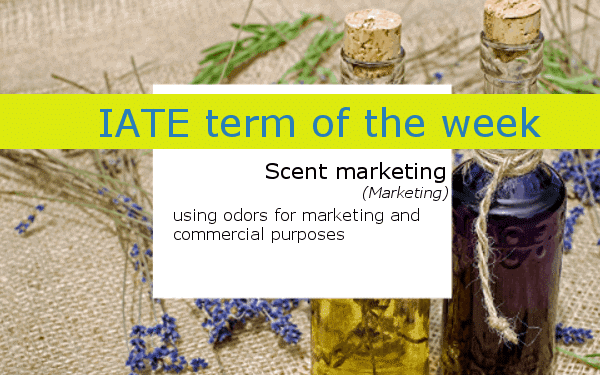I still remember the smell of freshly baked croissants coming from the bakery toward our playground. My sister and I would then beg our parents to stop by and bring some pastries home – to the delight of our dentist. That delicious smell wafting across the street was more efficient than any flyer or TV advertisement, a powerful impact brands seem to be aware of, turning scent marketing, our IATE Term of the Week, into a billion-dollar business.

According to branding expert Martin Lindstrom, “75% of the emotions we generate on a daily basis are affected by smell.” Indeed, our sense of smell can spark a flurry of emotional memories in an instant. Instead of going to the cerebral cortex, where we process language and judgement, the smell goes to the limbic system, responsible for memory and emotion.
Even though most people are not aware of how smell affects them, brands are and do not hesitate to use as twice as imagination to win consumer spending and long-term brand loyalty. By using scent, marketers are creating an immersive brand experience.
Singapore Airlines is a pioneer in the practice. Any weary traveller could tell you – the stale air of an airline cabin is not the best smelling space. The airline recognized this over 30 years ago and decided then to develop a custom scent to spray on their hot towels, made of floral and citrus fragrance. By using these components – which evokes maternal love, care and cleanliness – Singapore Airlines help to reduce anxiety and improve customer experience in flight.
Another example could be American multinational Nike, which noted that scent marketing in retail stores “increased intent to purchase by 80%.” So, if you were thinking of a new strategy to boost the sales of your retail store, it seems that Nike marketers found the right antidote. Just do it.
Here, you can see the entry for scent marketing in IATE:

We would appreciate your contribution to update this term in your language. An IATE terminologist of the relevant language will be in charge of the validation of contributions and, thus, a delay is to be expected

If you are interested in marketing and want to learn a bit more about other trends, you could check related glossaries through our Glossary Links tool, as well as our recently updated EU Glossaries’ list!
Have a nice week-end!
Written by Laura Campan – Translator, Liaison Interpreter and Communication Manager, currently completing a six-month communication internship at the Terminology Unit of the European Parliament (Luxembourg)
Prepared by Elena Sychkova – Study visitor at the Terminology Coordination Unit and a student of the Master programme in Learning and Communication in Multilingual and Multicultural Contexts at the University of Luxembourg. Elena has a Master’s degree in the Russian language and Literature, and Bachelor’s degree in English Philology.
Sources:
- Shopify (2016), The Science of Smell: How Retailers Can Use Scent Marketing to Influence Shoppers. Available at: http://bit.ly/2w3pzY8 (Accessed 24 August 2017)
- Air Aroma (2014), Teaching Smell Association. Available at: http://bit.ly/2wM5kiv (Accessed 24 August 2017)
- TEDx Talks (2016), Why Smell is More Important Than You Think. Available at: http://bit.ly/2wtlcHa (Accessed 24 August 2017)
